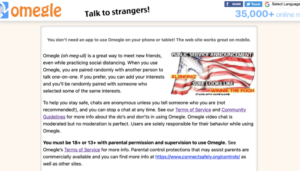
In late November 2021, a 19-year-old woman filed a $20 million lawsuit against Omegle, a free online chat website, claiming the site matched her with a sexual predator when she was 11.
The suit states that in 2014, a man in his late 30s matched with the claimant on Omegle, promising to help her “feel better.” For the next three years, the man forced the claimant to perform sexual acts for him and his friends by threatening to release her photos and videos, the lawsuit reads.
In 2018, Canadian police raided the man’s home and found over 3,000 files of child pornography, which included over 200 photos and videos of the claimant. The man subsequently pleaded guilty to possession of child pornography and communicating with a person under 18.
This recent lawsuit, paired with similar stories of children being groomed and abused by predators on Omegle, has raised questions about the safety and security of the web-based chatroom.
Omegle: What It Is and Who’s Using It
Omegle, founded in 2009, touts itself as “a great way to meet new friends.” With the words “talk to strangers” positioned across the top of its webpage, the web-based chatroom grants users the ability to communicate with anyone from anywhere. The online application randomly pairs users together in anonymous chatrooms where they communicate via text or video. Omegle does not verify users’ age, nor does it require users to provide email, phone numbers, or social media accounts.
Omegle is designed so that users can meet strangers quickly. Once a user wants to end an interaction, they can hit the “stop button” and be placed in another room with a different user.
While Omegle was developed more than a decade ago, the pandemic and the emergence of TikTok, has increased the online chatroom’s popularity with children. According to reports, the site grew globally from 34 million monthly visits in January 2020 to 65 million in January 2021. Reports also show that on TikTok alone, videos that are tagged with “Omegle” were watched more than 9.4 billion times.
Omegle generally requires users to be at least 18 years old, but users 13 and up can still use the app with parental permission and supervision. Additionally, no registration or age verification is needed to use the application—which has, in part, spawned concerns about the application’s safety.
Safety Concerns: Anonymous Matching and No Age Verification
While Omegle’s “talk to strangers” tagline has raised red flags for some, the website’s randomized matching and lack of verification systems have given rise to public scrutiny.
Firstly, Omegle does not allow users to report, flag, or block chats that are inappropriate or harmful interactions. “Users are solely responsible for their behavior,” the site’s homepage states. Additional sources say that at one point, Omegle’s response to harmful interactions was to “disconnect if anyone makes you feel uncomfortable.” To combat these interactions, the company claims it moderates rooms, however, the site also states that “no moderation is perfect.” Users also have the choice of entering “unmoderated rooms.”

The anonymity and the lack of meaningful safeguards create an environment where users can engage in “prurient interests” with little to no consequence. According to sources, users go to Omegle “when they’re horny and looking for fun.”
When questioned about the sexual content on Omegle, which includes advertisements for porn, the Omegle CEO stated, “Omegle isn’t intended for prurient interests, and when adults visit Omegle with that intent, it makes more sense to direct them somewhere more suitable.” However, in a report by the BBC, researchers said that within the span of one two-hour session, Omegle connected them with “12 masturbating men, eight naked males and seven porn adverts.” Researchers also said they were paired with two young boys masturbating on live chats.
Critical Implications
These reports illuminate how easy it is for children to be exposed to adult content, given Omegle failure to register its users or verify their ages. This presents a problem, especially since it’s widely known that child predators use Omegle to meet and groom children.
According to the Internet Watch Foundation (IWF), researchers have found internet material created by child predators who have “captured and distributed footage from Omegle.” Despite these findings and reports of child abuse, Omegle has only cautioned its users rather than identify and prevent abusive users, sources say. Up until May 2021, Omegle’s homepage warned users that “predators have been known to use Omegle, so please be careful.”
Cyber security experts have cautioned users and parents alike about the risks of using Omegle. Since the pandemic, a cybercrimes task force in Missouri says cybercrime tips have increased exponentially. A representative from the task force says the lack of verification measures grants predators access to children looking for social interaction. “These predators are so good about finding weaknesses and how to get through to them,” the task force said.
If you or someone you know has been the victim of a sex crime initiated through Omegle or other apps or social media, contact us at 888-283-9922 or e-mail sexual abuse lawyer, Adam Horowitz today.
